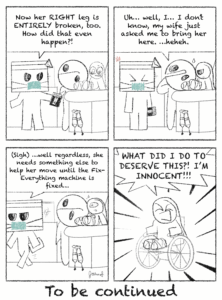Twelve freshmen on the fourth floor of Susan B. Anthony Residence Halls were removed from their rooms and placed in housing on the Residential Quad Tuesday night.
“We just had an ongoing problem [on the floor] all year,” Director of Residential Life Logan Hazen said. “Alcohol, drugs, academic performance – a whole bunch of things.”
Instead of sending “a whole bunch” of individual cases to the Dean of Students’ Office for disciplinary action, ResLife, the Dean of Students and the Dean of Freshmen decided to enact the administrative element of the housing contract, which allows the college to change housing assignments at their discretion, according to Hazen.
While similar decisions to move residents from rooms have occurred in the past, only five people at the most had been moved at one time before this incident.
“Nothing else had worked along the line,” Hazen said. “We needed a disruption to get them to refocus.”
On Monday, students were told to meet with Associate Dean of Students in charge of discipline Matt Burns for a 9 a.m. meeting the following day.
The twelve freshmen met with Burns and Senior Associate Director of Residential Life Laurel Contomanolis, while some were able to talk with Dean of Students Jody Asbury, according to Burns.
“Staff have been working hard from a variety of offices and drawing on a wide variety of expertise to build a strong community on that floor throughout the year,” Asbury said. “In spite of all their efforts, it became necessary to separate that community in order to allow for rejuvenation and growth of something new for everyone. The decision by the Residential Hall administration to make this administrative decision was a tough one and one that was done in consultation with many people in The College – it was done for a variety of reasons and after very careful consideration.”
After the meeting, parents were notified of the decision and moving vans and carts were provided for the students, according to Hazen.
The students were expected to move from their rooms in Sue B. in three hours, according to freshmen Gabe Malseptic, who was moved to Hoeing.
“It’s just ridiculous,” Malseptic said of the notification and decision. “It was rude and inconsiderate. The group was doing fine academically.”
Responding to the assertion that the twelve had drug and alcohol problems, Malseptic said that the number of incidents were “nothing above the campus norm.”
“We didn’t even get due process,” freshman Natalie Modzelewski said. “People are calling us the ‘dirty dozen.'”
Freshman Catalina Berry, who was relocated to Gilbert, said that she was unfairly forced to move.
“I’ve never smoked anything in my life [or] drank anything,” Berry said. “[It was] surprising, it was overwhelmingly traumatic.”
Freshman Emma Chiappa agrees that administration needed to step in to deal with problems on the floor.
“[The decision] was abrupt, but I think they needed to take some action,” she said.
“A lot of things that happened seem like they could have been resolved if they talked to other students first,” freshman Tyler Freedman, a resident of Sue B., said. “[They] skipped a bunch of steps in the administrative process. It makes [the atmosphere] very uncomfortable. Everyone could be kicked off for any reason.”
“I’ve never been written up or spoken to by [Residential Advisors] so this is random and weird,” freshman Latrice Akuemoah, who now lives in Gilbert, said. “[After the meeting] I was distraught, [but they] still expected us to move and go to class, so we all missed class. It was a very disruptive day.”
Akuemoah misses her old hall, and feels it is unfair that they are forbidden from entering Sue B. “Our entire hall was crying. They miss us, they want us back.”
The decision, however, can be appealed to Asbury, according to Hazen.
“The College is based on communal principles that assumes that students will exercise their freedom and choices in responsible ways,” Asbury said. “This administrative decision was designed to allow all students from this hall the opportunity get back into environments where their ability to exercise freedom responsibly has greater possibility.”
While noting that it was a “pretty dramatic decision,” Hazen said, “We’ve created a new environment. This is a disruption that will hopefully lead to some positive change.”
Schnee can be reached at cschnee@campustimes.org.


